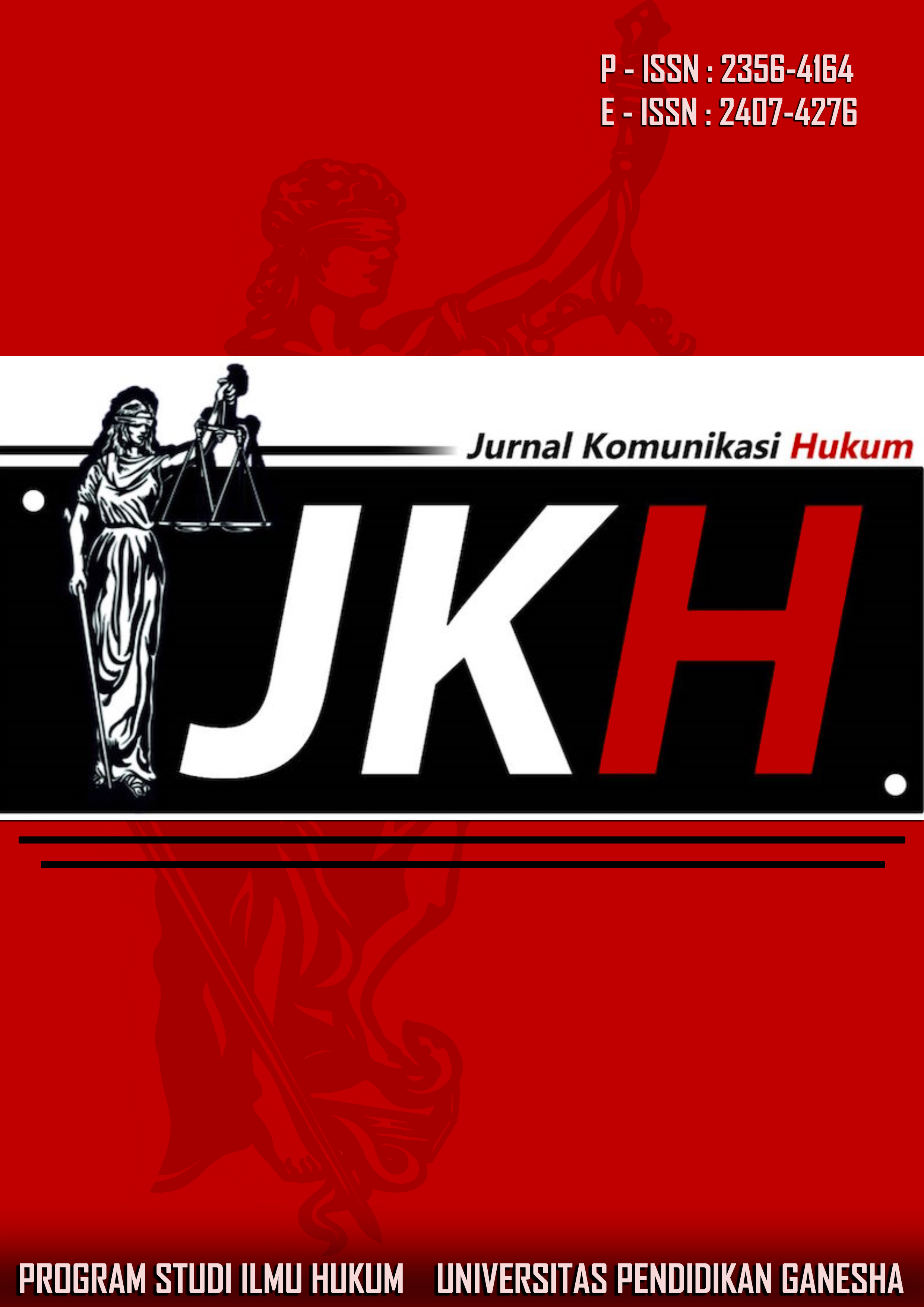PENEGAKAN DAN PERLINDUNGAN HAK ASASI MANUSIA DI INDONESIA DALAM KONTEKS IMPLEMENTASI SILA KEMANUSIAAN YANG ADIL DAN BERADAB
DOI:
https://doi.org/10.23887/jkh.v5i2.16497Keywords:
Perlindungan, Penegakan, Hak Asasi Manusia, Indonesia, PancasilaAbstract
Hak asasi manusia yaitu hak yang dimiliki oleh manusia sebagai makhluk ciptaan tuhan. Hak asasi manusia telah menempuh perjalanan yang jauh untuk berjuang demi mendapatkan keadilan bagi manusia di seluruh dunia. Secara historis, usaha-usaha yang ditempuh untuk memecahkan persoalan kemanusiaan telah dilaksanakan sejak lama di dunia, dan tidak ada seorangpun yang mengetahui secara pasti sejak kapan hak asasi manusia mulai diperjuangkan. Kronologis konseptualisasi penegakan HAM yang diakui secara yuridis-formaldiawali dengan munculnya perjanjian Agung (Magna Charta) di Inggris pada 15 juni 1215, selanjutnya Petition of Rights di Inggris tahun 1628 yang juga dikenal dengan the Great of the Liberties of England, Deklarasi kemerdekaan Amerika Serikat pada 6 Juli 1776, Deklarasi hak-hak asasi manusia dan negara (Declaration des Droits de I’Homme et du Citoyen/Declaration of the Rights of Man and of the Citizen) di Prancis tahun 1789, Deklarasi Universal tentang hak asasi manusia (Universal Declaration of Human Rights/UDHR). Penegakanan hak asasi manusia merupakan cerminan atau perwujudan dari sila pancasila yang kedua yaitu kemanusiaan yang adil dan beradap. Penegakan hak asasi manusia terjadi karena adanya pelanggaran hukum yang dilakukan. Penegakan dan perlindungan hak asasi manusia di Indonesia mengalami kemajuan pada tanggal 06 Nomber 2000, di mana Dewan Perwakilan Rakyat (DPR) mengesahkan Undang-undang Nomor 26 Tahun 2000 mengenai Pengadilan Hak Asasi Manusia (HAM) yang diundangkan pada tanggal 23 November 2000. Pembentukan Komnas Ham dan Pengadilan HAM juga merupakan sebuah kemajuan dalam penegakan dan pengadilan tentang hak asasi manusia di Indonesia. Pancasila pada hakikatnya merupakan sistem nilai yang berasal dari nilai-nilai luhur kebudayaan bangsa Indonesia yang berkembang sepanjang sejarah, dan berakar dari kebudayaan Indonesia. Penegakan hak asasi manusia adalah tugas seluruh lapisan masyarakat, bukan hanya tugas bagi lembaga negara saja. Semua lapisan masyarakat tersebut diharapkan dapat berkerjasama dan saling membantu dalam menegakkan hak asasi manusia demi tercpapainya perwujudan sila Kemanusiaan yang adil dan beradab dan terciptanya masyarakat yang sejahtera.
Human rights are rights owned by humans as creatures of God. Human rights have traveled a long way to fight for justice for humans throughout the world. Historically, the efforts taken to solve humanitarian problems have been implemented for a long time in the world, and no one knows for sure since when human rights began to be fought for. Chronology of the conceptualization of human rights enforcement that was recognized legally-formally beginning with the emergence of the Great Agreement (Magna Charta) in England on 15 June 1215, then the Petition of Rights in England in 1628 which was also known as the Great of the Liberties of England. July 6, 1776, Declaration of human rights and state (Declaration des Droits de I'Homme et du Citoyen / Declaration of Rights of Man and of the Citizen) in France in 1789, Universal Declaration of human rights (Universal Declaration of Human Rights / UDHR). Enforcement of human rights is a reflection or manifestation of the second Pancasila precept, namely just and humanitarian humanity. Enforcement of human rights occurs because of legal violations. Enforcement and protection of human rights in Indonesia made progress on 6 November 2000, where the House of Representatives (DPR) passed Law Number 26 of 2000 concerning the Human Rights Court (HAM) promulgated on 23 November 2000. Establishment of the National Commission Ham and the Human Rights Court are also advances in the enforcement and trial of human rights in Indonesia. Pancasila is essentially a system of values that originates from the noble values of Indonesian culture that developed throughout history, and are rooted in Indonesian culture. Enforcement of human rights is the duty of all levels of society, not just the task of state institutions. All levels of society are expected to be able to collaborate and help each other in upholding human rights in order to achieve the realization of the principle of just and civilized Humanity and the creation of a prosperous society.
Downloads
Published
How to Cite
Issue
Section
License
Authors who publish with this journal agree to the following terms:- Authors retain copyright and grant the journal right of first publication with the work simultaneously licensed under a Creative Commons Attribution License that allows others to share the work with an acknowledgement of the work's authorship and initial publication in this journal.
- Authors are able to enter into separate, additional contractual arrangements for the non-exclusive distribution of the journal's published version of the work (e.g., post it to an institutional repository or publish it in a book), with an acknowledgement of its initial publication in this journal.
- Authors are permitted and encouraged to post their work online (e.g., in institutional repositories or on their website) prior to and during the submission process, as it can lead to productive exchanges, as well as earlier and greater citation of published work (See The Effect of Open Access).
Authors who publish with this journal agree to the following terms:
- Authors retain copyright and grant the journal right of first publication, with the work [SPECIFY PERIOD OF TIME] after publication simultaneously licensed under aCreative Commons Attribution License that allows others to share the work with an acknowledgement of the work's authorship and initial publication in this journal.
- Authors are able to enter into separate, additional contractual arrangements for the non-exclusive distribution of the journal's published version of the work (e.g., post it to an institutional repository or publish it in a book), with an acknowledgement of its initial publication in this journal.
- Authors are permitted and encouraged to post their work online (e.g., in institutional repositories or on their website) prior to and during the submission process, as it can lead to productive exchanges, as well as earlier and greater citation of published work (See The Effect of Open Access).












